Iraqis Protest As US Sanctions On Iran Weakens The Dinar
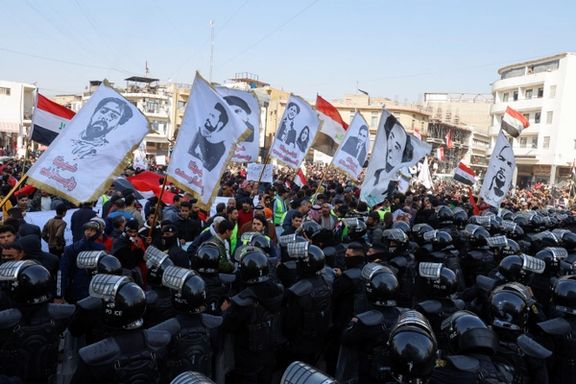
The impact of US banking sanctions on Iran has affected neighboring Iraq, weakening its currency and leading to protests against the government.

The impact of US banking sanctions on Iran has affected neighboring Iraq, weakening its currency and leading to protests against the government.
Hundreds of people demonstrated near central bank headquarters in Baghdad Wednesday to protest at the recent slide of the Iraqi dinar against the dollar that has triggered a rise in prices of imported consumer goods.
Hundreds from different Iraqi regions waved Iraqi flags or carried banners demanding government intervention to stop the dinar's decline to around 1,620 to the greenback from 1,470 in November.
The dinar went into a tailspin against the dollar after the New York Federal Reserve imposed tighter controls on international dollar transactions by commercial Iraqi banks in November to halt the illegal siphoning of dollars to neighboring Iran, which is under tough US sanctions.
Under the curbs that took effect this month, Iraqi banks must use an online platform to reveal their transaction details. But most private banks have not registered on the platform and resorted to informal black markets in Baghdad to buy dollars.
This has created dollar shortages as demand has outstripped supply and accelerated the dinar's descent against the greenback.
“Our demands are clear: government must intervene to stop the decline of dinar value because we’re suffering from high prices in local markets,” said Asaad Khudhaer, a laborer who came from the southern city of Najaf to attend the protest.
“Stop the neighbors stealing our dollars,” one banner read, alluding to Iran.
Prime Minister Mohammed al-Sudani replaced the central bank governor on Monday as he had not taken effective steps to tackle the consequences of the new Fed regulations and their impact on the dinar, government sources told Reuters.

The United Sates is “robustly engaged” with enforcing sanctions on Iran and regularly engages with China to discourage violations, the State Department said Tuesday.
“As Iran’s largest oil customer, the PRC remains a top focus for our sanctions enforcement,” State Department spokesperson Ned Price said in a briefing with reporters.
For two years, the department has stayed low-key on the issue of China violating US oil sanctions on Iran and buying ever-increasing volumes of crude oil at discounted prices.
“We don’t preview potential sanctions actions, but we continue to monitor Iran’s oil exports and to engage Iran’s trading partners about the possibility of exposure to US sanctions,” Price added.
But these efforts and engagements with different countries have not been effective as Iran increased its oil exports from around 250,000 barrels per day in 2019 to more than one million, according to estimates. For some reason, China was buying less than 200,000 barrels a day during the Trump administration, while in 2022 it was buying around 700,000 barrels to most industry estimates.
Neither China nor Iran announce the volume of their oil trade, which takes place through intermediaries who make tanker-to-tanker oil transfers, mix cargoes, and forge documents to hide the source of the oil.
Chinese imports from Iran began to increase in late 2020, exactly when candidate Joe Biden in September of that year announced his plans to return to the Obama-era Iran nuclear deal, which Trump had abandoned two years earlier.
The new administration began indirect negotiations with Iran in April 2021, and China, as a signatory of the 2015 deal known as the JCPOA, was part of the talks in Vienna. From all appearances, Iran dragged out the talks for 18 months and in the end refused to accept a compromise deal put on the table by the European Union.
In the meantime, Tehran was selling ever-increasing volumes of oil to Chinese refineries and making tens of billions of dollars.
At the same time, the Biden administration was signaling that sanctions imposed by its predecessor were not effective to force Iran to curtail its nuclear program, and they should be lifted to revive the JCPOA. At the same time, the administration kept the sanctions on the books to put pressure on Tehran and occasionally announced sanctions on individuals and companies caught red-handed in facilitating sanctions’ violations.
“We, during the course of this administration, have levied multiple tranches of designations targeting Iran’s illicit petroleum and petrochemical trade over the past year or so,” Price said on Tuesday.
But to what extent there was serious pressure on Beijing, is not clear. It seems that the administration now admits its efforts have been ineffective and it intends to increase that pressure.
The new focus began only when the nuclear talks came to a halt in September, just when popular protests broke out in Iran that were met with a brutal and deadly government response that became world headlines.
The administration changed its tune in October, saying that it is no longer focused on JCPOA and its attention is on the struggle of the Iranian people who were demanding their basic rights. Price reiterated the new policy once again on Tuesday, admitting that Iranians “renege on commitments, and “This was a pattern that we’d seen from Iran.”
Another factor that left little option for the Biden team except adopting a tougher posture was Iran’s delivery of kamikaze drones to Russia that have been used against civilian targets in Ukraine.
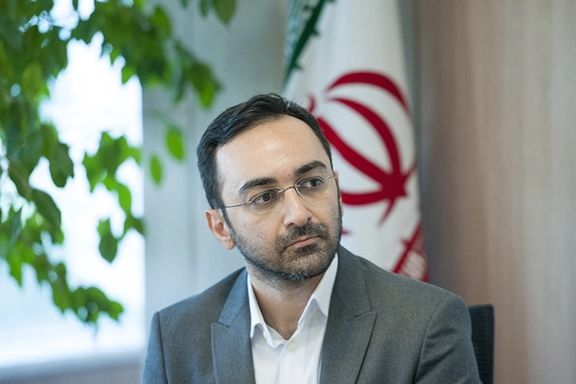
A member of the Tehran Chamber of Commerce says that the scope of US sanctions has been extended to friendly countries, including China, the UAE, and Iraq.
Mehrad Ebad told ILNA Tuesday that these countries have limited their commercial dealings with Iran.
Previously, some Iranian officials had confirmed that an important part of the country's exports rely on hidden middlemen and barters, including the exchange of oil with goods, which increases the cost of imports and reduces the profit of exports.
Ebad also stated that currently exports from Iran to Europe have reached their lowest level and the largest volume of Iranian exports to Europe, especially Eastern Europe, is carried out through Turkey.
The European Union has not yet published the trade volume for 2022 with Iran, but in 2021, it had about 900 million euros of imports from Iran, which was less than a tenth of the amount before the US imposed sanctions in 2018. Also, the European Union's exports to Iran have decreased by a third and declining to 3.9 billion euros.
Ebad went on to say that large European companies abide by the US sanctions and do not easily communicate with Iran, "but small and medium-sized companies from Germany and Italy continue to cooperate with Iran,”
If Europe's restrictions increase, “we will face a serious challenge in meeting our needs, especially in the field of technology in the oil and gas sector,” he underlined, referring to fresh European sanction being imposed on Iran for its human rights violations and supply of drones to Russia.
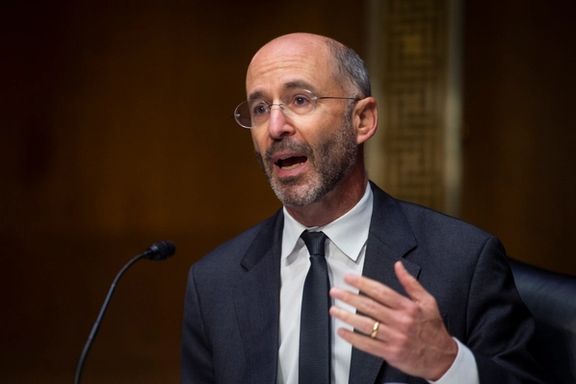
The Biden Administration will pressure China to stop importing Iranian crude oil, US Special Envoy for Iran Robert Malley told Bloomberg television on Tuesday.
“China is the main destination of illicit exports by Iran” and the United States will intensify talks to dissuade Beijing not to break US sanctions, Malley told Bloomberg.
The Trump administration imposed third-party sanctions on Iran’s oil exports after it withdrew from the 2015 nuclear accord, but China increased its purchases when President Joe Biden got elected and pledged to return to the agreement known as the JCPOA.
Latest estimates are that small Chinese refineries are buying at least 700,000 barrels per day at discounted prices through middlemen and illicit channels. Beijing does not officially report the Iranian oil cargoes as they are usually labeled as shipments from other countries.
Some reports say Iranian oil shipments increased in December, but it is not clear if exports to China have surged or more exports are sent elsewhere, such as Venezuela.
Critics have been accusing the Biden administration of not exerting enough pressure on Beijing to stop imports from Iran, hoping that China will play a positive role in nuclear talks with Tehran. These negotiations came to a halt last September and since then the US and its European allies have adopted tougher positions against Iran, for its human rights violations and supplies of kamikaze drones to Russia.
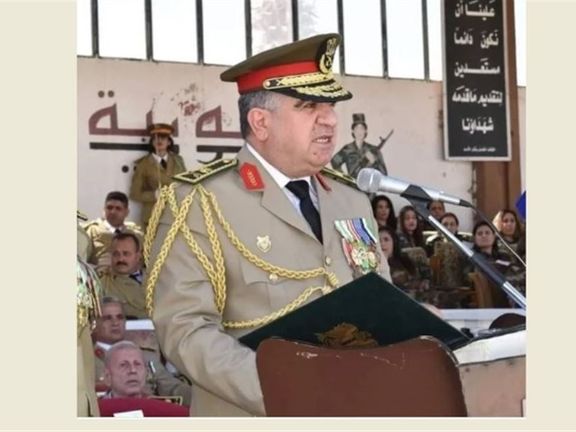
In a meeting with the Syrian defense minister, Iran’s President Ebrahim Raisi has said the Islamic Republic is ready to help Damascus financially in rebuilding the country.
Raisi also described the relations between the two countries as strategic stating that Iran will always stand by Syria.
“The Islamic Republic of Iran is a true friend of the Syrian nation because it stood by the Syrian nation and government during the period of resistance against terrorism and is ready now to stand by them during the reconstruction period by boosting all-round economic cooperation,” Raisi told the Syrian minister Ali Mahmoud Abbas.
The comments by Raisi comes at a time when Iran is facing one of its most severe economic crises with the national currency at a historic low, with tens of millions hit by unexpected poverty.
Meanwhile, in a separate meeting, Commander of the Revolutionary Guard Hossein Salami told the Syrian official that Tehran is ready to help Bashar al-Assad’s armed forces in the required fields.
On Monday, Chairman of the Chiefs of Staff of the Iranian Armed Forces Mohammad Bagheri also expressed the Islamic Republic’s willingness to help the Syrian military in restructuring, training, and supplying equipment. He further stressed the need for staging a joint military wargame by Iran and Syria.
The extent of Iranian military expenditures and financial aid to Syria to keep President Bashar al-Assad in power is not known, but by some estimates Tehran has spent more than $30 billion over the last decade to support Assad’s regime.
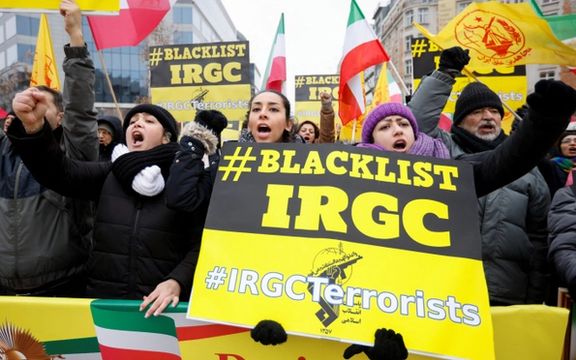
Iran slammed new sanctions imposed by the European Union and Britain and said it would retaliate, although the EU stopped short of listing the IRGC as terror group.
"The Islamic Republic will soon announce the list of new sanctions against the human rights violators of EU and England," Iran's Foreign Ministry Spokesperson Nasser Kanaani said in a statement.
At the same time, a Tehran newspaper carried the headline, “Europe stopped at Iran’s redline.” Some hardliners expounded on this argument saying that Tehran’s threats to Europe not to designate the IRGC had worked and it had stopped short of designating the Revolutionary Guard as a terrorist organization.
A newspaper under the control of an influential regime insider said on Tuesday that the EU sanctions “had done most of the job,” short of officially listing the IRGC as a terror group.
The paper, Farhikhtegan, said to be affiliated with Ali Akbar Velayati, a close advisor to Supreme Leader Ali Khamenei wrote the a vote at the European Parliament last week labeling the IRGC as terrorist had done the damage. This will have its negative impact on Iran’s commercial relations with the world, the newspaper said.
The European Union imposed sanctions on more than 30 Iranian officials and organizations, including units of the powerful Revolutionary Guards, blaming them for a "brutal" crackdown on unrest and other human rights abuses.
The United States and Britain also issued new sanctions against Iran, reflecting a deterioration in the West's already dire relations with Tehran.
The sanctions are the latest response to Iran's deadly clampdown on unrest after the death of young Iranian Kurdish woman Mahsa Amini in morality police custody in September.
The Biden administration Monday imposed sanctions on Iran’s Islamic Revolutionary Guard (IRGC) Cooperative Foundation and some senior Iranian officials.
The US Treasury said in a statement that the new action targeted a "key economic pillar of the IRGC, which funds much of the regime’s brutal suppression; as well as senior security officials coordinating Tehran’s crackdown at the national and provincial levels."
The Treasury described the IRGC Cooperative Foundation as an economic conglomerate established by senior officials of the group to manage its investments and presence in sectors of Iran's economy.
British sanctions included an asset freeze on Iranian deputy prosecutor general Ahmad Fazelian, who the British foreign office said was responsible for an unfair judicial system that used the death penalty for political purposes. Other individuals affiliated with the IRGC were also sanctioned.
Iran's security forces, mainly controlled by the Revolutionary Guard, and supported by the hardliner judiciary have killed around 500 civilians since anti-regime protests erupted in September.
Iranian activists in the West reacted very negatively on social media to the EU decision not to designate the IRGC as a whole, mostly blaming EU foreign policy chief Josep Borrell for preventing it with the hope of more nuclear talks with Iran.
Iranian officials were issuing a whole series of threats to Europe in the past week, including targeting European military forces in the Middle East and closing the Hormuz Strait to European commercial shipping. That is one sort of threat tactic that has been used so often by Islamic Republic officials that it has lost its luster.
A member of the Iranian parliament on Tuesday raised the issue, saying that threatening to close Hormuz “has become silly,” and no one believes the threat anymore.